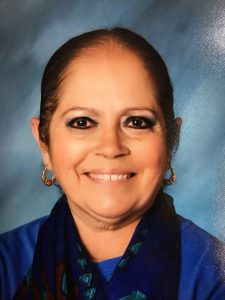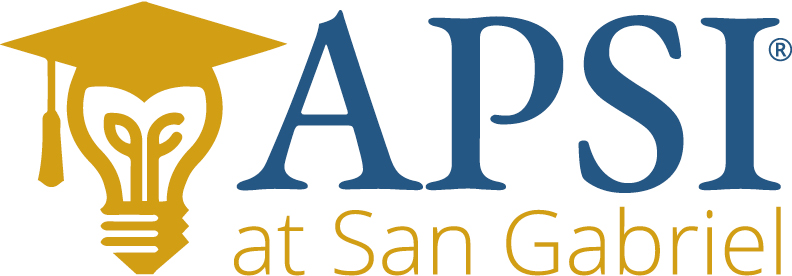Angélica M. Jiménez
 Angélica M. Jiménez has taught all levels of Spanish at Redwood High School in Visalia, CA since 1984, with her forte being courses for Heritage Speakers and AP Spanish Literature & Culture. She also serves as a lead for her PLC, as well as advisor for Redwood’s “Sociedad Honoraria Hispánica”. Additional experiences include adjunct Spanish instructor at College of the Sequoias, and participation in the UC Consortium’s project “Spanish Literature for Spanish Speakers”. For the last three years she has been a lead presenter for the advanced strands in the “Central California World Language Project” at Bakersfield Community College and Fresno State.
Angélica M. Jiménez has taught all levels of Spanish at Redwood High School in Visalia, CA since 1984, with her forte being courses for Heritage Speakers and AP Spanish Literature & Culture. She also serves as a lead for her PLC, as well as advisor for Redwood’s “Sociedad Honoraria Hispánica”. Additional experiences include adjunct Spanish instructor at College of the Sequoias, and participation in the UC Consortium’s project “Spanish Literature for Spanish Speakers”. For the last three years she has been a lead presenter for the advanced strands in the “Central California World Language Project” at Bakersfield Community College and Fresno State.
Education: BA in Chicano Studies from UCLA in 1981; teaching credential from UCLA in 1982; upper division course work from Fresno Pacific University and CSU Fresno in “Engagement Strategies”, “Literacy in Action” and “Cohesive Writing”.
College Board Consultant Experience: AP Spanish Reader for AP Spanish Literature & Culture since 2005; College Board Workshop Consultant in AP Spanish Literature & Culture since 2007; member of the “AP Spanish Literature Test Development Committee”, 2010-11; serves as a Mentor for the College Board’s consultant pool; member of the SAT2 Subject Test in Spanish Test Development Committee in July 2013-16.
Publications: College Board AP Spanish Literature, 2006-07 Professional Development Workshop Materials, and Special Focus: Writing about Literature; collaborator on the workshop consultant materials for the 2012 “Redesign of the AP Spanish Literature & Culture Workshops”; maintains her online blog at: http://ajimenezapslc.wordpress.com/ to help support AP Spanish Literature & Culture instructors and students around the world that visit the blog.
Family: Lives in the foothills near Lindsay, CA with her husband; they have two adult children and four grandchildren.
Course Objectives
- Survey participants and to make an effort to meet their needs and expectations
- Analyze and discuss the College Board’s Equity and Access philosophy statement; review the format of the AP Spanish Literature and Culture exam
- Allow participants to take the entire MC section of the AP exam; at least one short response and one Free Response essay, and to debrief the experience with other participants
- Review information on the AP Spanish Literature and Culture course, including the Fall 2012 Course Exam and Description; Assist participants to become familiar with the six course themes, sub-themes, essentials questions, and Achievement Level Descriptors
- Allow participants to brainstorm and discuss lesson components using the above items
- Demonstrate the AP Central website, its resources (for educators and students), including the “AP Teacher Community” for AP Spanish Literature and Culture
- Share information on textbooks designed for the course, information on the Course Audit and Course Syllabus and the curricular requirements, share typical calendars for teaching the AP Spanish Literature and Culture course (with the four sample Course Syllabi)
- Review the 2019 AP Spanish Literature and Culture exam draft student samples from June AP Reading
- Allow participants to draw conclusions regarding a curriculum aimed at preparing students for the required tasks on the AP exam
- Share with participants writing strategies and connections with Common Core State Standards, and to allow participants to draw conclusions regarding formative and summative types of assessment which will prepare them for the required tasks on the AP exam
To allow participants to:
- Brainstorm supplementary materials that can be used for the course
- Brainstorm and share formative and summative assessments to use within specific themes and/or works
- To give participants the opportunity to do at least 4 hours of research in the laboratory and/or laptops (reviewing resources and preparing the APSI project, [TBA])
- To allow participants to present their completed APSI project, either in groups or in front of the class, depending on number of participants; create a network of colleagues by exchanging contact information for further communication and sharing of ideas via email or telephone
- To share ideas and discuss successful strategies and activities used in their classrooms for:
- teaching and practice of literary terms
- teaching of poetry
- incorporating music, video and other multimedia resources
- incorporating student literature projects
To share consultant-made reading/writing strategies and activities:
- “Escribe/Di Algo” (double-entry reading journal)
- “Apuntes Literarios” (2-sided “ficha” for documenting key points in text)
- “Las Pautas” (scoring guidelines for “short response” and essays)
- Cooperative learning and engagement strategies
Agenda*
Day 1
- Welcome, introductions and overview of the next four days
- Activity with the College Board Equity and Access Philosophy Statement
- Distribution of College Board and publisher materials for the APSI
- College Board Information with PPT Slides (mandatory)
- Overview of the AP Spanish Literature and Culture Course, including the required reading list, the Learning Objectives, Achievement Level Descriptions, Course Themes and Literary Terminology
- Assign the 2019 APSI Project-Instructions and assigned literary piece (one of the 38 in the course)
- Overview of AP Central website, including information on “AP Spanish Literature and Culture”, the “Course Audit”, “College Board Online Score Reporting” and the “AP Teacher Community”
- Share Jiménez’s Blog, as time allows
- Complete “Reflection” activity for Day 1
Day 2
- Review of the EXAM format; taking the AP Spanish Literature and Culture exam, Section 1 (Multiple Choice) —Debriefing the Experience!!
- Participant Research in the Computer Lab (as allowed by site’s availability) or on personal laptops
- Best Practices, Instructional Strategies and Resources for Prose with special emphasis on reading and note-taking strategies, engagement structures. It is highly recommended that participants find a copy of the readings for Days 2 and 3 and read BEFORE the APSI:
- El hombre que se convirtió en perro, 1989 (Osvaldo Dragún, Argentina), (mandatory major work to analyze the six course themes)
- La casa de Bernarda Alba, 1936 (Federico García Lorca, España)
- …and Q/A about other works requested by participants
- Complete “Reflection” for Day 2
Day 3
- Review of the EXAM format; taking the AP® Spanish Literature and Culture exam, Section 2 (one Short Answer and one Essay)—Debriefing the Experience!!
- Best Practices, Instructional Strategies and Resources for Poetry, focusing on lessons/materials for the following poems. Recommended that participants read these BEFORE the APSI:
- Soneto CLXVI, 1612 (Luis de Argote y Góngora, España)
- A Roosevelt, 1905 (Rubén Darío, Nicaragua)
- Peso ancestral, 1919 (Alfonsina Storni, Argentina)
- …and Q/A about other poems requested by participants
- Working with literary terms
- Complete “Reflection” for Day 3
Day 4
- Finish any activities from the previous three days (if needed)
- “Putting it all together”: Participant presentations (matching the assigned works with the course themes, helping students make interdisciplinary connections through literary, historical, sociocultural and geopolitical contexts)
- Complete “Reflection” for Day 4 before lunch!
- Strategies to cultivate a powerful learning environment in the AP classroom: class and team-building structures, class t-shirts, monthly recognition, end-of-year certificates.
- Closure of APSI with the exchange of participant contact information for future networking
- Evaluations, certificates…¡y despedidas!
*subject to change as per participants’ needs
















